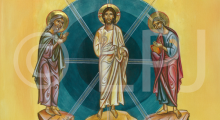Issued by the Catholic Center for Studies and Media - Jordan. Editor-in-chief Fr. Rif'at Bader - موقع أبونا abouna.org

Following is the text of the meditation by Latin Patriarch of Jerusalem His Beatitude Pierbattista Pizzaballa for the 27th Sunday of ordinary time, Year C, October 2, 2022:
Among Jesus’ many encounters with people, some of them are with people of “great” faith. It is Jesus himself who recognizes it and, somehow, gives them as an example for the disciples and the crowd.
It is the case of the centurion, in Capernaum (Luke 7:1-10), who asks Jesus to heal his much-loved servant. In the same chapter 7, where a woman who had come to the house of Simon, a Pharisee, made a great gesture of love towards Jesus, and He sends her away justified. He does it by telling her that her faith has saved her (Luke 7:50). Jesus says the same phrase in speaking to the woman with the hemorrhage (Luke 8:48), and we could cite other cases.
In what sense is their faith great, and in what sense does it get the miracle they need?
It seems to me, starting with these cases, that the faith of those is great who are unaware of having it, who are not worried about it. They are men and women driven to the Lord out of a great need, great sorrow, or great love. It is the faith of the small that is great.
This introduction enables us to listen to today’s Gospel (Luke 17:5-10), taken from a chapter that deals with various aspects of community life.
Two issues are taken into consideration today, faith and service. The perspective is unique wherein the two are placed, namely the dialectic between greatness and smallness.
In the first, the disciples ask Jesus to have great faith. Jesus answers them that faith the size of a mustard seed, one of the smallest seeds there is, is enough.
He says this to get them out of the temptation of thinking about the dynamics of faith in a perspective of greatness, power, ability, success. Faith itself does not make us great or better persons. Instead, great faith is the attitude of those who continually are like little children; those who never cease to be surprised, to ask, and to desire.
We do not get it by increasing it, but by becoming little and pure of heart, in the spirit of the Beatitudes.
It is not a coincidence that Jesus reproaches the disciples for their little faith (Luke 8:22-25). They show it in the time of need when they let fear overwhelm them when sensing their strength inadequate. The poor, on the other hand, do not rely on their power, and they know how to transform their need by prayer, by persistent prayer.
When faith is genuinely tremendous, born from a humble heart, it has a surprising result that of restoring man in his dominion over creation. In some way, everything is newly established under his authority. It suffices to say a word, and even the trees obey him. (Luke 17:5)
The same dynamic, to some extent, we find in the second part of the passage. (Luke 17:7-10)
There is even someone there who is tempted to think great of himself, once he has done his duty.
But it is not so: following Jesus does not make disciples important persons, with many rights and privileges, because the only privilege is that of being a servant.
When we live like this, like servants who are happy to be servants, then we become authoritative, we possess real power, that of giving life.
Jesus often returns to this dynamic, so it is just those who can welcome, serve, make themselves last who are genuinely great.
Anyone wishing to base his authority on other prerogatives would become like a master that commands and gives orders. But then his power would not be different from that of any other ruler of this world.







